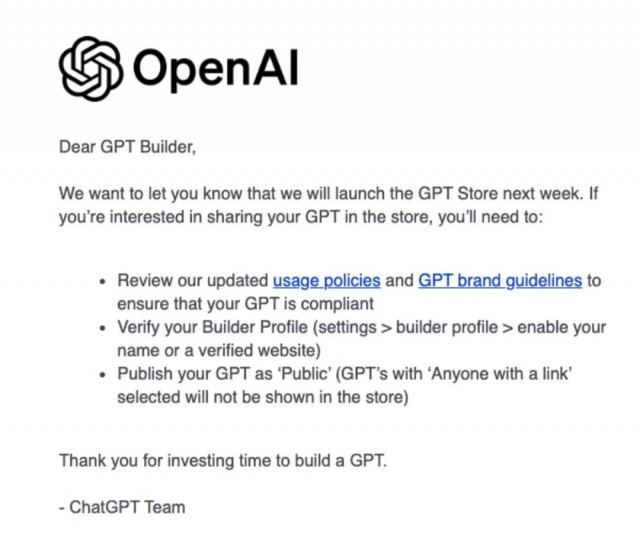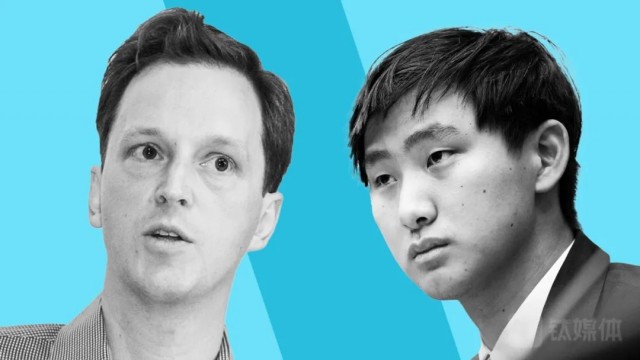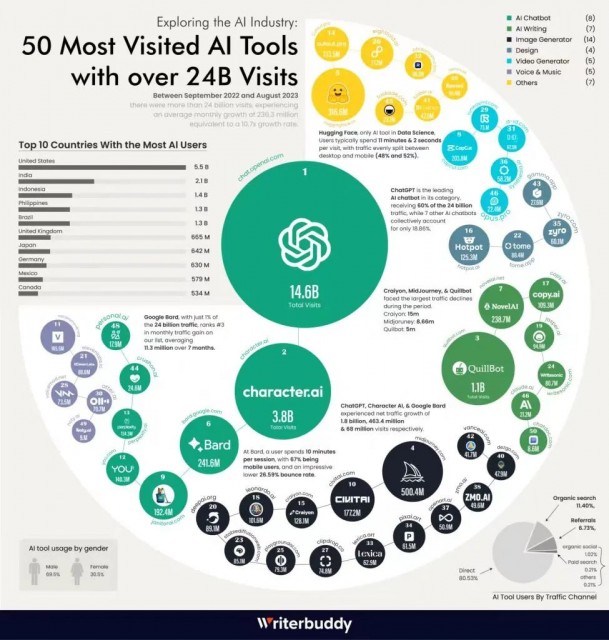Large Models Usher in the 'AppStore Moment', OpenAI Offers New Visions for 2024
-
Overnight, OpenAI announced several major updates that have captured market attention.
According to Titanium Media App on January 5, this morning, OpenAI sent an email to all GPT developers stating that a customized 'GPT Store' will launch next week, which is expected to drive continuous improvement in the ChatGPT developer ecosystem. The GPT Store is hailed as the Apple App Store of the large model field.
In Titanium Media's year-end special dialogue 'What is 2023'—'Zhao Hejuan in Conversation with Wang Weijia and Zhang Hongjiang'—Zhang Hongjiang had previously predicted that with GPT-4 opening Plug-in, GPT would no longer be just a large model but a platform, completely replacing the App Store and Google Play.
Meanwhile, The Information also revealed two important pieces of news about OpenAI overnight: first, OpenAI is preparing to compromise and has offered some U.S. news organizations annual licensing fees of $1 million to $5 million to use their content for model training; second, OpenAI is discussing the addition of board members and has identified two candidates, including Scale AI co-founder and CEO Alexandr Wang, and former GitHub CEO and investor Nat Friedman.

In fact, thanks to the popular chatbot platform ChatGPT, OpenAI, a company less than nine years old, achieved an annual recurring revenue (ARR) of $1.6 billion in 2023, marking a staggering 56-fold increase compared to the previous year. The company's valuation has also soared to $100 billion.
With the imminent launch of GPT Store and GPT-5, OpenAI is poised to become the most formidable "dark horse" in the tech industry in 2024.
The 'App Store Moment' for Large Models Arrives Next Week
On January 5, Eastern Time, OpenAI sent a memo to all custom GPT developers, announcing plans to launch the "GPT Store" next week. This store will allow AI model developers to create customized OpenAI chatbots for various purposes and formats, such as designing lesson plans for middle school teachers.
As early as the first OpenAI Developer Conference in early November 2023, CEO Sam Altman officially announced the GPT Store product. The platform requires no coding, offering fully visual click-and-operate functionality, with plans to release it for Plus subscribers that same month. However, two weeks after the announcement, OpenAI plunged into a leadership crisis as Altman was repeatedly ousted and reinstated. This "CEO removal incident" significantly impacted GPT Store's development timeline, ultimately delaying its launch.
Sam Altman publicly stated, "Some unexpected events kept us busy."
Now, multiple sources confirm that the GPT Store is finally arriving next week.
Reportedly, the GPT Store serves as a customizable ChatGPT mode requiring no coding—users interact entirely through visual clicks. By submitting dialogue instructions, supplementary knowledge data, and selecting optional features like web search, data analysis, or image generation, users can quickly develop specialized GPT assistants for fields like law, finance, and healthcare.
Specifically, first, users need to log in to https://chat.openai.com/auth/login and register a Plus account; second, after logging in, click the "Explore" button in the upper left corner to enter the custom build mode; third, the platform will pop up a page where you can click "Create a GPT" to start building your custom GPT or access other features like the GPT Store; finally, by clicking "Create," you can customize your GPT assistant or perform more complex operations such as uploading data and attachments. Ultimately, through GPT Builder, you can form your own custom GPT assistant and save it as either a private or public model, which can then be shared in OpenAI's upcoming custom GPT Store.

OpenAI stated that the company plans to find a way to compensate GPT creators based on API usage in the store, but no other details about the plan have been disclosed yet.
The email content is as follows:
Dear GPT Developer,
We are excited to announce that we plan to officially launch the GPT Store next week. If you wish to showcase your GPT creations on this platform, please take note of the following points:
Please carefully review and adhere to our newly updated usage policies and GPT brand guidelines to ensure your creations meet our standards.
Please go to "Settings > Developer Profile" to verify your profile, which includes confirming your name or linking to a verified website.
Please set your GPT to "Public" status. GPTs set to "Anyone with the link" visibility will not be displayed in the store.
We appreciate the valuable time and effort you've invested in building GPTs and look forward to seeing your outstanding creations go live.
Bloomberg points out that with the launch of the GPT Store app marketplace, it may threaten many AI startups that provide similar chatbot customization services.
Li Zhifei, founder and CEO of Mobvoi, once stated that OpenAI plugins can connect ChatGPT with third-party applications, enabling solutions such as real-time sports scores, stock prices, latest news, booking flights and hotels, online shopping, and ordering takeout. He believes this new entity might be a "hybrid" integrating content generation, search, and recommendation functions. For AI, regardless, it represents a significant turning point. As this new species continues to evolve, people need to maintain an open mindset and avoid trying to understand it through outdated perspectives.
"A few days ago, Jensen Huang announced that the 'iPhone moment' for AI has arrived, and now some are saying ChatGPT has become a new operating system with its own app store," Li Zhifei remarked.
The Battle for AI Content Licensing Simultaneously Intensifies
OpenAI Reportedly Offers Up to $5 Million for Content Licensing Negotiations
In addition to the upcoming GPT Store, OpenAI is negotiating licensing agreements with dozens of institutions to address AI model training content infringement issues.
On the evening of January 4, Beijing time, The Information reported that OpenAI is in talks with up to 12 U.S. content publishers, including The New York Times, aiming to finalize agreements similar to those reached with the Associated Press and Axel Springer, the parent company of Politico. OpenAI has proposed annual licensing fees ranging from $1 million to $5 million to some institutions. However, the report noted that the offered amounts are lower than expected, which may make it difficult to reach final agreements.
According to Bloomberg, Tom Rubin, OpenAI's head of intellectual property and content, stated: "We are engaged in many discussions and negotiations with numerous content publishers. The talks are positive, constructive, and progressing well. You've seen the announced agreements, and there will be more in the future." Currently, Axel Springer has secured a multi-year licensing deal worth tens of millions of dollars.
Earlier, The New York Times Company announced a lawsuit against OpenAI and Microsoft, accusing them of using its content in their products without authorization, thereby infringing on copyright. The New York Times had attempted to negotiate an agreement to "ensure fair value for the use of its content," but the talks failed to reach a resolution. The Information cited an executive who predicted that more such lawsuits may emerge in the future.
In response, OpenAI stated in a declaration that it respects "the rights of content creators and owners and is committed to working with them to ensure they benefit from AI technology and new revenue models." The company expressed "surprise and disappointment" at The New York Times' lawsuit and "hopes to find a mutually beneficial way to collaborate, as we have with many other publishers."
Meanwhile, Apple and Google are also negotiating content licensing agreements. According to The Information, Apple is finalizing AI deals with 12 U.S. news organizations, including NBC News, Condé Nast (parent company of The New Yorker), and IAC (owner of The Daily Beast), proposing multi-year agreements worth at least $50 million. Google, on the other hand, has reached customized agreements with The New York Times and others regarding content algorithms and ad revenue sharing.
For the generative AI industry, the lawsuit filed by The New York Times against ChatGPT highlights the growing significance of obtaining proper content licensing for large language models. Currently, OpenAI is attempting to adopt more comprehensive approaches to content authorization, aiming to legally use relevant materials for training its GPT models in future AI products.
Geoffrey Manne, President and Founder of the International Center for Law & Economics, noted that compared to other lawsuits, The New York Times' case against OpenAI appears more compelling because the newspaper provided verbatim examples to the court. With millions of copyrighted articles involved, The New York Times ultimately seeks damages exceeding $750 million from OpenAI.
Additionally, a January 5th report from The Information revealed that OpenAI has begun searching for potential board members, including Scale AI CEO and co-founder Alexandr Wang, along with former GitHub CEO and investor Nat Friedman. Both individuals are likely candidates to join OpenAI's board, though negotiations remain in early stages and final outcomes may change.

Alexandr Wang graduated from the Massachusetts Institute of Technology (MIT) and was once selected as one of the top 20 physics students in the U.S. Physics Olympiad. Today, he is the co-founder and CEO of Scale AI and one of the youngest self-made billionaires. At the age of 19, he dropped out of college to establish Scale AI, having previously held technical executive positions at companies like Quora. Currently, Scale AI is valued at approximately $7 billion.
Alexandr Wang has a long-standing and multifaceted relationship with OpenAI, dating back to 2016 when he participated in the Y Combinator incubator led by Sam Altman. OpenAI is also a customer of Scale AI. Additionally, notable figures such as Quora CEO Adam D'Angelo, OpenAI President Greg Brockman, and Nat Friedman have invested in Scale AI.
Nat Friedman, also a graduate of MIT, was born in the United States. In June 2018, after Microsoft announced its $7.5 billion acquisition of GitHub, Friedman became CEO of GitHub in October of that year, stepping down in November 2021. After leaving Microsoft, Nat Friedman primarily works as a venture capitalist and has invested in over 100 startups, including Scale AI.
As of now, OpenAI's board members consist of former Salesforce CEO Bret Taylor, former US Treasury Secretary Larry Summers, and Adam D'Angelo. Typically, OpenAI's board has nine seats, but it remains unclear how many new members they are seeking to fill.
After surpassing 24 billion global visits, will the generative AI industry cool down or maintain its momentum in 2024?
On December 30, The Information reported that due to ChatGPT's strong growth, OpenAI's annualized revenue (ARR) for 2023 has exceeded $1.6 billion, a 56-fold increase from the $28 million in 2022, generating at least $130 million in monthly revenue. At this growth rate, OpenAI's management believes that by the end of 2024, its annualized revenue could reach $5 billion or even more.
Over the past year, the emergence of ChatGPT has not only sparked a new wave of AI enthusiasm but also marked the beginning of a new era, captivating the world. Simply put, AI may have been the biggest theme—if not the only theme—in the entire tech industry in 2023.
Recently, research firm Writerbuddy released data analyzing over 3,000 AI tools and ultimately identified the top 50 global AI products, representing over 80% of the industry's traffic.
The report shows that from September 2022 to August 2023, just the top 50 AI tools generated over 24 billion visits, averaging 2 billion monthly visits with a 1070% (10.7x) monthly growth rate, reaching 236.3 million visits.

Among these, ChatGPT alone contributed 14.6 billion visits, ranking first and accounting for over 60% of analyzed traffic. Americans generated 5.5 billion AI software visits (22.62% of total), while European countries collectively contributed 3.9 billion visits. Over 63% of AI tool users accessed via mobile devices. Gender data shows 69.5% male users versus 30.5% female users.
According to the "State of AI 2023" report by AI investor Nathan Benaich and Air Street Capital, as of September 19, 2023, there are 473 global AI unicorns: 315 in the US, 70 in China, and 27 in the UK. The total value of global AI unicorns reached $7.5 trillion, with US companies valued at $5.9 trillion and Chinese companies at $1.3 trillion.
With the explosive period of large models in 2023 behind us, the generative AI (AIGC) industry faces two expectations for 2024: either cooling down or generating a wave of applications.
The reason for the potential cooling down of the AIGC industry is that there is still a gap between domestic and international large models, and large models also need to face a "cooling-off period." Recently, Robin Li, founder, chairman, and CEO of Baidu, stated, "There are many large models in China, but AI-native applications developed based on these models are very few. Continuously repeating the development of foundational large models is a tremendous waste of social resources."
On the other hand, the industry generally believes that in 2024, the productization, industrialization, and commercialization of AI technology will be the top priorities for the development of large models. Fu Sheng, chairman and CEO of Cheetah Mobile and founder of OrionStar, recently stated that 2024 will be the year of the wave of AI large model applications.
Zhou Hongyi, founder and chairman of 360 Group, presented four major trends for large language model development in 2024:
- Large models won't be monopolized - their development path will resemble PCs, becoming ubiquitous in the future.
- Next year will see models pursuing both "large" and "small" parameters, with compact models quickly being deployed on smartphones and IoT devices.
- Multimodal capabilities will become standard for domestic large models, with significant progress expected in 2024.
- China will see numerous vertical large models entering various industries and moving toward industrialization.
He also predicted breakthrough growth in AIGC capabilities for text-to-image and text-to-video generation next year, though the emergence of potential killer consumer applications remains to be seen.
"Recently I've been thinking that if we examine what Adobe, Microsoft and Google are doing, we'll find AI may not create standalone killer apps, but rather enhance existing technologies and processes. Therefore, whether for B2B or B2C, all products will be reshaped by AI, though there may not be products relying solely on AI - it still needs to integrate with traditional businesses and products," Zhou stated.
This trend will also influence domestic AI investment in 2024. "In the large model field, technological leadership and differentiation will become key competitive factors. Investors should focus more on innovation and R&D capabilities, seeking projects that can deliver superior products and services," said Yuan Shuai, Deputy Secretary-General of Zhongguancun IoT Industry Alliance.
Wedbush Securities technology analyst Dan Ives wrote in a report: "We believe tech stocks will rise by 25% in 2024." He added, "Both Wall Street and the tech industry are awaiting the arrival of the 'Year of AI.'"
Ives believes that 2024 will be the "Year of AI," with tech stocks rising at least 25%, and potentially up to 35%.
David McCurdy, CTO of Insight Enterprises, stated: "As we step into 2024, nearly all business leaders are focusing on how AIGC technologies will reshape their operations and create new business models."
Yuan Shuai emphasized that in 2024, investments in China's AI large models will place greater emphasis on the commercial application prospects and business model innovation of projects, seeking those that can deliver actual returns and market share growth. Meanwhile, the expansion of commercial application scenarios will become another key investment direction.
